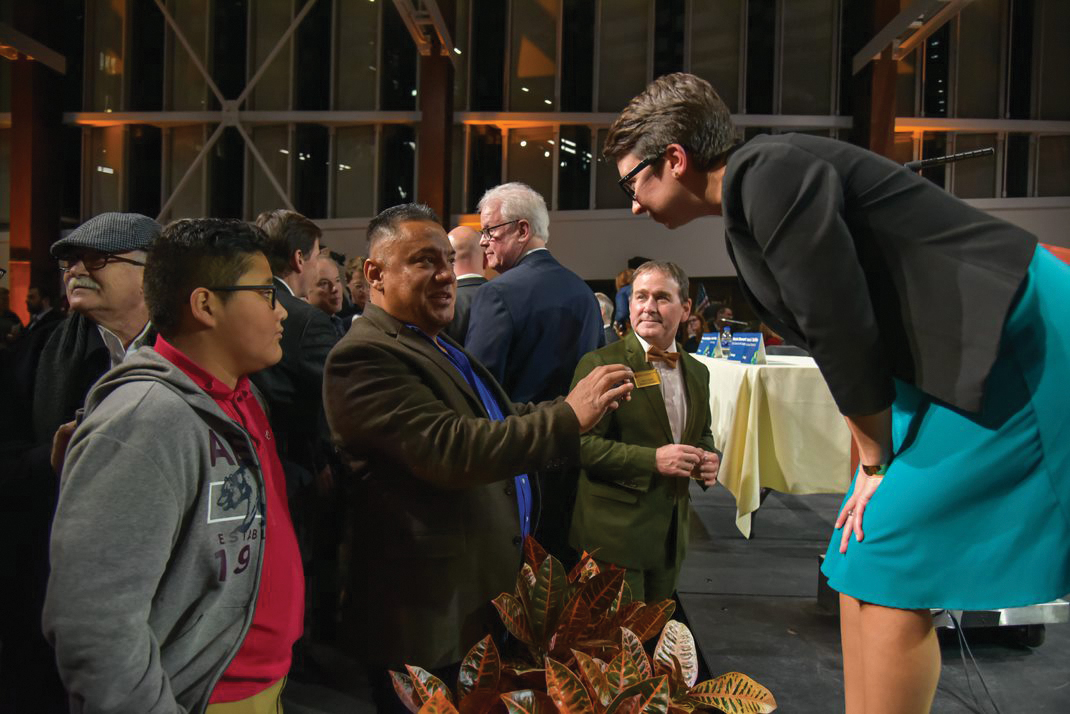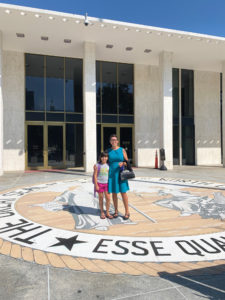At every stop along her career, Council member Nicole Stewart has found herself both as a leader and as a developer of future leaders. Now, as a foremost voice for a new perspective in Raleigh, she’s in that position again.
They don’t know how Nicole Stewart finds the time. As Raleigh’s Mayor Pro Tem, a mom of two, NC Conservation Network’s Development Director, board member for the N.C. League of Municipalities, and a participant in many other endeavors, they don’t know how she balances it all. It’s a refrain she hears often from colleagues and counterparts alike.
“It’s kind of exhausting,” Stewart says, not of the work but of the question. “I always just answer quickly and say, ‘I don’t know.’”
However she does it, she does it well. Stewart’s voice stands out. It stood out during her early career as an organizer, where issue-based motivations developed into political prowess, and it has stood out during her time on the Raleigh City Council, first as a dissenter and later as a foremost perspective among a new crop of perspectives. “With Nicole, we’re starting further down in the conversation,” said Megan Hinkle, policy analyst for Raleigh’s City Council office. “She does her homework.” From one project to the next—and often at the same time—Stewart has picked tasks that align with her goals, which can be broadly defined as equity. That notion informs the lot: her environmental passions, her climate objectives, her focus on affordable housing and schools and everything else, right down to the nitty-gritty work of ordinance making.
At each stop, she’s created leaders in her wake. The result is even more voices, gathering momentum to face enormous challenges and guide the ever-changing Raleigh into its future.
Stewart’s approach to her work is a combination of drive and know-how. The easy part is the drive. Moving from Connecticut to Apex at a young age, Stewart remembers her passion for environmental issues always being there, and she recalls a rich diversity throughout her upbringing as well in an area that was undergoing rapid change. “Diverse and quickly growing, and becoming even more diverse,” Stewart said of Apex. She followed those principles to the University of North Carolina at Wilmington, and after first considering marine biology, recognized that she would thrive more on the political side of the issue, rather than the hard sciences. She graduated with a degree in environmental studies, and almost immediately got a job back home in Wake County as an organizer for the NC Conservation Network.
The know-how ripened from here. Stewart recalls one story in particular from her early days in the role where mega-landfills were slated to be built in eastern North Carolina, all in predominantly African American communities. The landfills would be used as an endpoint for trash shipped down from the Northeast. “They were literally dumping on these communities,” Stewart said. A few years into her organizing work at this point, Stewart was adept at planning and holding protests, and that is what she did. Stewart worked behind the scenes to coordinate with longtime criminal justice advocates and church leaders in the area, and helped coordinate messaging across the groups, while also bringing in outside organizations such as the Sierra Club and Coastal Federation.
It was the community engagement portion that played the biggest part, Stewart believes, and ultimately, they were successful in stopping the project. “I do not kid myself in terms of how much those relationships with those African American leaders built me, built my view of diversity, equity, and inclusion… and shaped my young, 20-something-year-old naïve organizing self into who I would become,” she said.
 This period stands as a formative time in Stewart’s career. In 2008, she cofounded the Beehive Collective—a giving circle dedicated to creating women leaders that “pools money, time, and talent to impact our Raleigh community,” and has given more than $400,000 to local nonprofits since its launch, according to its website. Stewart and her friends were simply throwing fundraisers for fun before formalizing the organization. “We were pulling our collective resources. We all worked at either service industry or nonprofit jobs and didn’t make much, but we wanted to make a difference,” Stewart said. In the spirit of building new leaders, Stewart stepped off the Beehive board of directors after nearly five years. “If we’re serious about building new leaders, then the old ones have to get out of the way.” That approach to leadership would resurface later on the Raleigh City Council, but in the interim, Stewart remembers pouring her energies into both her work, where she was promoted to Development Director in 2011, and the small business community of the city through her husband, Les, who became the head brewer at Raleigh mainstay Trophy Brewing. She also had two children, Evan and Liza, now ages 12 and 9.
This period stands as a formative time in Stewart’s career. In 2008, she cofounded the Beehive Collective—a giving circle dedicated to creating women leaders that “pools money, time, and talent to impact our Raleigh community,” and has given more than $400,000 to local nonprofits since its launch, according to its website. Stewart and her friends were simply throwing fundraisers for fun before formalizing the organization. “We were pulling our collective resources. We all worked at either service industry or nonprofit jobs and didn’t make much, but we wanted to make a difference,” Stewart said. In the spirit of building new leaders, Stewart stepped off the Beehive board of directors after nearly five years. “If we’re serious about building new leaders, then the old ones have to get out of the way.” That approach to leadership would resurface later on the Raleigh City Council, but in the interim, Stewart remembers pouring her energies into both her work, where she was promoted to Development Director in 2011, and the small business community of the city through her husband, Les, who became the head brewer at Raleigh mainstay Trophy Brewing. She also had two children, Evan and Liza, now ages 12 and 9.
Still, despite the litany of new responsibilities, the desire to get fully involved reached a breaking point. After tossing the idea of public office around with Les and members of the Beehive Collective for the better part of a year, Stewart took the plunge. “It was time to give back in a bigger way,” Stewart said.
Again, the know-how was there. “I absolutely knew I could campaign,” Stewart said. “I had been doing grassroots organizing for 20 years.” The governing would come naturally too, Stewart figured, as she had decades of experience in both elevating issues and bringing people together through meeting facilitation. She ran at-large in the 2017 election, established a city-wide grassroots effort, and won.
 Stewart was the new voice in town, and she remembers being very much aware of that position during those first two years. “On a fractured council, she has consistently sided among the minority,” one news report would later describe. With the most recent city election though, the landscape somewhat changed, and—continuing a well-tread pattern—Stewart was able to lead while begetting new leaders. “I absolutely went from campaigning much through the first term, trying to get some messages out there about the issues and paint a different picture because I knew my vote wasn’t going to do much,” Stewart said. “Once new folks got here, it was time to govern.”
Stewart was the new voice in town, and she remembers being very much aware of that position during those first two years. “On a fractured council, she has consistently sided among the minority,” one news report would later describe. With the most recent city election though, the landscape somewhat changed, and—continuing a well-tread pattern—Stewart was able to lead while begetting new leaders. “I absolutely went from campaigning much through the first term, trying to get some messages out there about the issues and paint a different picture because I knew my vote wasn’t going to do much,” Stewart said. “Once new folks got here, it was time to govern.”
The issues important to Stewart are both immense and local. Concerns like climate resilience and affordable housing—problems so large that the authority of a municipal official seems futile in comparison. It hasn’t slowed Stewart. Similar to her first term, it may even motivate her, pushing her to find new solutions to these issues that she had not previously considered. “I really came to understand that city politics are just a different beast,” Stewart said. The nonpartisan nature of local government, while initially presenting unforeseen political challenges soon began to present unforeseen friendships. “We can’t do it alone. This isn’t something we get to solve by ourselves… (The first term) helped me understand people in different ways, and made me want to build relationships with people I had not built relationships with before.”
The N.C. League of Municipalities Board of Directors have facilitated those relationships, with one success story recently coming to fruition through the state budget passed in November. On the issue of natural disaster and flood resiliency, Stewart, Shallotte Mayor Walt Eccard, Lumberton Council Member Owen Thomas, and Kinston Mayor Don Hardy—a group that represents urban and rural interests alike—worked together to mobilize their respective networks, write op-eds, and advocate at the state legislature for inclusion in the budget. It worked, resulting in $300 million in relevant appropriations. “It’s amazing how quickly we can get to say, ‘It’s not about partisan politics. Let’s talk about the issues.’ All the sudden, we’re not just affecting city politics. We’re affecting across the board.”
For Stewart, these issues fit together like machinery and, like nearly all city business, comes down to a question of how to manage growth. The COVID-19 pandemic upended enough of the entrenched assumptions in Raleigh to potentially open up some opportunities, and she has a vision. “What if we could come out of COVID and be a city of equity?” Stewart said. “To me, what that looks like is neighborhoods that have diverse homes, diverse people living in them that support diverse schools,” leading to what she terms “the 15-minute city”—a neighborhood where schools, employment, and key services and businesses are all a short walk away. “Then that gets us to our climate goals, which gets to our equity goals, which gets to our housing goals.”
 It’s a wholesale, self-perpetuating vision, which Stewart pursues through a set of ideals. For example, as she describes, reliable water infrastructure should not be a point of contention with each new development, but rather a bare minimum citywide. It’s a practical approach to the day-to-day business of city governance, and yet still a noticeable change from the incrementalism that she first observed when joining council. “It’s more about how we get structural change into the code, rather than piecemeal one-by-one rezoning,” Stewart said.
It’s a wholesale, self-perpetuating vision, which Stewart pursues through a set of ideals. For example, as she describes, reliable water infrastructure should not be a point of contention with each new development, but rather a bare minimum citywide. It’s a practical approach to the day-to-day business of city governance, and yet still a noticeable change from the incrementalism that she first observed when joining council. “It’s more about how we get structural change into the code, rather than piecemeal one-by-one rezoning,” Stewart said.
Her viewpoint is one that is gaining traction on the Raleigh City Council. No longer the lone dissenter, Stewart is now able to put forth ideas and policies that are well-informed by the city itself, of which she and her family are an integral part. During 2020, when Les would come home to talk about the declining business and difficulty in hiring staff at Trophy Brewing, Stewart’s perspective on the impacts of the pandemic expanded. When certain city programs come up for funding consideration each budget cycle, Stewart can speak with firsthand familiarity to many of them, including the Weather Bound program through Raleigh’s Parks and Recreation Departments, which provides emergency childcare when schools are closed for the day. “She’ll speak from experience,” said Hinkle. “We haven’t seen that at the table in a while. It’s neat. And as a mom, it’s good to feel represented up there.”
It’s yet another example of Stewart serving as the voice for a group and a cause. It’s an unmissable theme. She notes that it wasn’t exactly intentional in each instance, but rather began with a question: what if? “What if we start the Beehive Collective, and it becomes a force people recognize?” she said. “What if we ran for city council, and we’re able to carry that voice—to be the only young, working mom on council?”
What if leaders created leaders to follow after? It’s a movement worth trying for Stewart. It’s working thus far.
“She’s different,” Hinkle said. “In a good way.”













